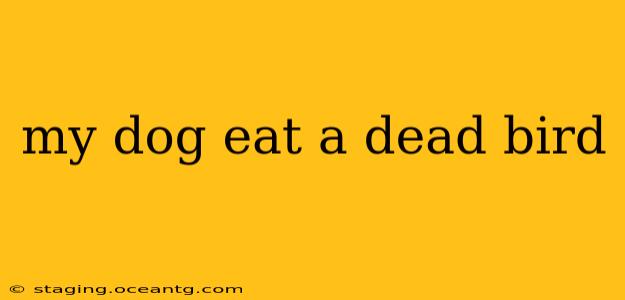My Dog Ate a Dead Bird: What Should I Do?
Finding your dog with a dead bird in its mouth is alarming. While many dogs will scavenge, consuming a deceased animal presents potential health risks. This comprehensive guide explores the immediate actions you should take, the dangers involved, and steps to prevent future incidents.
What are the immediate risks if my dog ate a dead bird?
This is a crucial concern. Dead birds can carry various pathogens, including Salmonella, E. coli, and Campylobacter, which can cause severe gastrointestinal upset in dogs. Additionally, birds might harbor parasites like worms or protozoa, potentially infecting your canine companion. Depending on the bird's cause of death, toxins or diseases could also be present. The risk is amplified if the bird was already decomposing.
Should I take my dog to the vet immediately?
While not always an emergency, it's wise to monitor your dog closely. Look for symptoms like vomiting, diarrhea, lethargy, loss of appetite, or changes in bowel movements. If you notice any of these, especially if they are severe or persist, contacting your veterinarian immediately is crucial. They can assess your dog's condition and advise on the best course of action, which might involve inducing vomiting (only if advised by a vet), administering medication, or running tests.
What if my dog ate the bird hours ago and shows no symptoms?
Even if your dog seems fine hours after consuming the bird, vigilance is still essential. Some diseases have incubation periods, meaning symptoms might not appear immediately. Continue to observe your dog for any changes in behavior or health and contact your vet if any concerns arise.
How can I prevent my dog from eating dead animals in the future?
Preventing this behavior requires proactive steps:
- Supervise your dog: Especially during walks, keep your dog on a leash and within your sight. Active supervision is the most effective preventative measure.
- Train your dog: Teach a strong "leave it" command. Reward your dog for ignoring dead animals or other potentially harmful items. Positive reinforcement training is key.
- Secure your yard: If your dog has access to your yard, ensure it's adequately fenced to prevent scavenging.
- Clean up promptly: If you notice a dead bird or animal in your yard or on your walk route, remove it immediately.
What are the long-term health consequences for my dog?
While many dogs will experience only mild gastrointestinal issues, the long-term consequences depend on what the bird carried. Parasite infections might require medication, and certain bacterial infections could cause more serious and long-lasting health problems if untreated. Regular vet checkups are vital for early detection of any health issues.
This information is for general knowledge and does not constitute veterinary advice. Always consult your veterinarian for any concerns about your dog's health. They can provide personalized recommendations based on your dog's breed, age, and specific situation.
